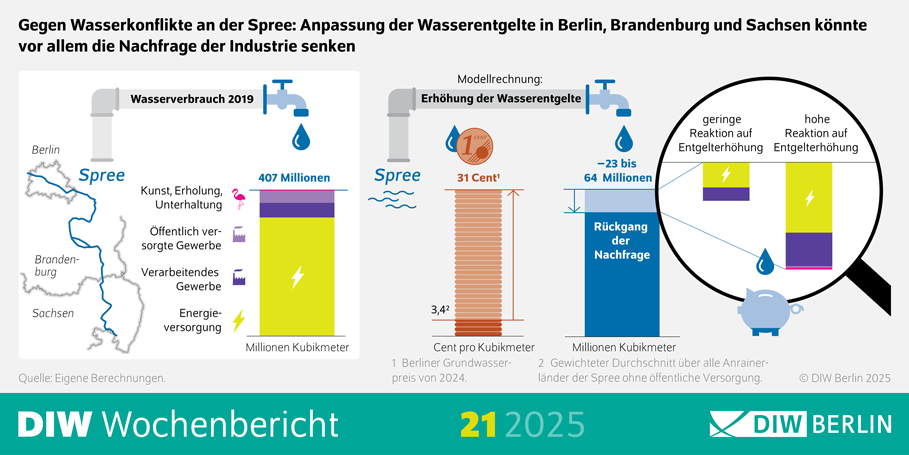Raising water abstraction charges could ease Spree river shortages, DIW study finds
A recent study by the German Institute for Economic Research (DIW Berlin) and the Technical University of Berlin (TU) suggests that harmonising and raising water abstraction charges in Berlin, Brandenburg, and Saxony could significantly reduce water demand along the Spree River. The researchers estimate that aligning water charges with Berlin’s current groundwater rates could lower demand by up to 16 percent, offering a potential solution to the region’s growing water shortages.
The Spree has long been supported by groundwater pumped from opencast lignite mines in Lusatia. However, with the planned phase-out of lignite-fired power generation by the 2030s, these artificial inflows will cease. The result is a looming water deficit that may intensify competition between agriculture, industry, tourism, municipal services, and environmental needs.
The study examined various pricing scenarios and found that energy producers, industry, and commerce would achieve the largest reductions in water use. According to Claudia Kemfert, head of the Energy, Transport and Environment Department at DIW Berlin, the findings demonstrate that better pricing mechanisms can act as a viable alternative to controversial infrastructure proposals, such as diverting water from the Elbe to the Spree.
Kemfert argues that transferring water from the Elbe would merely shift water scarcity from one region to another, affecting areas such as Hamburg. Instead, she advocates for a shift in political strategy toward sustainable water management through a combination of economic instruments and ecological restoration.
In addition to pricing reforms, the study highlights measures to increase water availability. One recommendation is the renaturation of river floodplains, which could contribute as much as 0.66 cubic metres of water per second to the Spree. This approach is seen as a more environmentally sustainable means of boosting supply without disrupting hydrological balances elsewhere.
Christian von Hirschhausen, another co-author of the study, emphasises the potential benefits of bringing forward the lignite phase-out. Contrary to concerns that an early exit from coal might worsen the water situation, the study suggests it would ease pressure on groundwater systems and support a more sustainable transition. He also notes that water management in Lusatia should be decoupled from the timeline of coal phase-out planning. Continued pumping from former mines, on a transitional basis, could help mitigate the supply gap.
The researchers further suggest that reducing the planned surface area of future opencast mining lakes could conserve water. They warn that as water levels drop, unresolved tensions between competing users will intensify unless addressed proactively. Identifying these distribution conflicts early on will be key to avoiding disputes and ensuring equitable access.
Ultimately, the study positions coordinated demand and supply-side reforms as more effective and sustainable than large-scale water transfers. Policymakers are urged to revise incentive structures, strengthen environmental regulation, and invest in nature-based solutions to manage future water needs in the Spree region.









